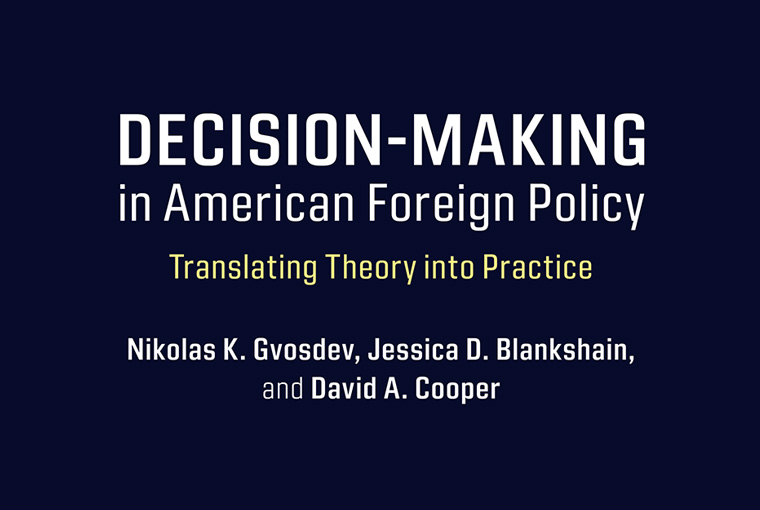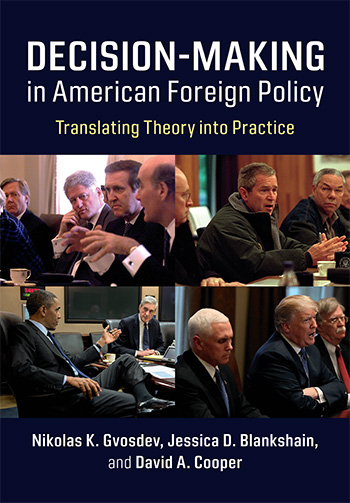National Security professors write cutting-edge foreign policy theory textbook

Focus is on educating national security professionals
Three U.S. Naval War College professors have written an American foreign policy theory textbook aimed at a unique niche: non-academics bound for national security jobs.
 “Decision-Making in American Foreign Policy, Translating Theory into Practice,” released by Cambridge University Press in January.
“Decision-Making in American Foreign Policy, Translating Theory into Practice,” released by Cambridge University Press in January.The professors are Nikolas K. Gvosdev, Jessica D. Blankshain and David A. Cooper in the National Security Affairs Department.
Cooper, who is the James V. Forrestal Professor of National Security Affairs, said the project was born from a chance conversation with a book publisher who asked what foreign policy textbooks he used.
“I said, we don’t use any textbooks,” Cooper remembers, adding that his department had searched for a good advanced text on foreign policy analysis without success.
“They are all either undergraduate level, which won’t work, or they are graduate-level books by academics for academics.”
Cooper said the next question was obvious: Do you want to write it?
The result was “Decision-Making in American Foreign Policy, Translating Theory into Practice,” released by Cambridge University Press in January.
The book’s goal is to reach current or future practitioners – students in public policy or international relations master’s or upper-level undergraduate programs who are not planning to pursue a Ph.D. In other words, a big swath of the people working or bound for federal government, including military officers.
The authors feel there’s no other foreign policy book out there focused on this demographic.
 David A. Cooper, James V. Forrestal Professor of National Security Affairs
David A. Cooper, James V. Forrestal Professor of National Security Affairs“We were trying to take a big, messy 50 years of academic literature on the theories of how and why American foreign decisions are made and turn it into something that was cohesive for students – but at the same time wasn’t dumbing it down,” Cooper said.
“This really was a gap not just for our students here at the Naval War College but for a whole category of students in international relations,” he said.
According to the Association of Professional Schools of International Affairs, at least 67 institutions offer graduate degrees in international affairs, and about a third of graduates go on to careers in the public sector.
Those are the students the authors believe are most served by this new work.
“We have, in essence, distilled years of practitioner experience to better prepare new generations of policymakers as to what they can expect when they enter the national security realm," Gvosdev said.
The three professors come at the subject from different directions.
Blankshain is the traditional academic, with a 2014 Ph.D. in political economy and government from Harvard University, where she focused on bureaucratic politics, foreign policy and civil-military relations.
 Nikolas K. Gvosdev, professor in the National Security Affairs Department
Nikolas K. Gvosdev, professor in the National Security Affairs DepartmentGvosdev, a Russia specialist who recently co-authored books on American and Russian foreign policy, spent time at think tanks and as editor of The National Interest after getting his Ph.D. at the University of Oxford.
Cooper, who wrote a prior book on comparative foreign policy, worked at the Pentagon for nearly 20 years before dusting off his political science doctorate and switching to higher education.
The trio sees the book as a contribution to the “bridging the gap” movement, which aims to connect the arenas of academia and policy.
The book uses “caselets,” or short case studies, at the beginning of each chapter to give a real-world example of the theory to be discussed.
“These are the hook,” Blankshain said. “We’re saying, ‘We’re about to throw a bunch of theory at you, so let’s start with something that’s relevant’” to students.
For instance, the chapter about bureaucratic politics begins with the story of U.S. military involvement in Lebanon in the summer of 1982. The size and length of the U.S. deployment there was a compromise between the Pentagon and the State Department.
 Jessica D. Blankshain, assistant professor in the National Security Affairs Department
Jessica D. Blankshain, assistant professor in the National Security Affairs DepartmentThe analysis section of that chapter goes on to dissect what this example says about how bureaucracy shapes foreign policy:
It would seem impossible to explain the 1982 Beirut deployment, particularly in its details, without also considering the need to find a compromise between the diametrically opposing positions of the secretaries of state and defense, who each believed they were resolutely fighting for what they perceived as the core bureaucratic interests of their departments.
This is the first textbook by any of these writers. The project reflects the authors’ feelings about the value of teaching, they said.
Blankshain said she and her colleagues previously “got by” without a text of this kind.
“It took the three of us feeling like we were reinventing the wheel every time we taught this to decide we wanted to spend our nights and weekends for two years writing this,” she said.
The book has received advanced praise from Valerie Hudson, a leading foreign policy scholar at Texas A&M University, and retired Navy Adm. James Stavridis, dean emeritus of the Fletcher School of Law and Diplomacy.
